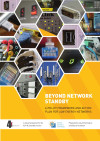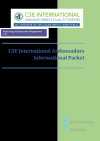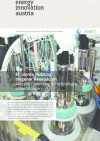Suchergebnisse für "Factsheet: Energietechnologien gestalten, die für alle sinnvoll und nutzbar sind"
Net Zero Fahrplan: Ein globaler Wegweiser, um das 1,5°C-Ziel zu erreichen
Auf der Grundlage der neuesten Daten zu Technologien, Märkten und der aktuellen Politik wird in diesem Bericht eine aktualisierte Version des Szenarios "Netto-Null-Emissionen bis 2050" (NZE) vorgestellt.
IEA Wind TCP Task 26: Phase 3 Final Technical Report (2019)

Internationale Betrachtung der Erzeugungskosten von Windenergie im Zeitraum von 2008 bis 2016.
Edited by M.M. Hand
Herausgeber: National Renewable Energy Laboratory
Englisch, 104 Seiten
Beyond Network Standby: A Policy Framework and Action Plan for Low Energy Networks. (April 2014)

Dieser Bericht beschäftigt sich mit dem Energiebedarf digitaler Netzwerke und stellt dabei eine Richtung sowie einen Aktionsplan zur Verbrauchsreduktion vor.
Das IEA Leitbild ist anhand von realen Beispielen erklärt.
Lloyed Harrington, Bruce Nordman
Herausgeber: IEA - 4E Standby Power Annex and Energy Efficient Strategies - EES
Englisch, 60 Seiten
Downloads zur Publikation
IEA-DSM Spotlight Newsletter 56, March 2015

Der allgemeine Newsletter des IEA DSM Programms
Pamela Murphy
Herausgeber: IEA Demand Side Management Programme
Englisch
Downloads zur Publikation
IEA Wind TCP: Annual Report 2020
Der Jahresbericht liefert Informationen zum Fortschritt der Partnerländer beim nationalen Ausbau der Windenergie sowie zu aktuellen Aktivitäten und Erfolgen in den 17 internationalen Forschungskooperationen.
IEA ISGAN Annex 2: Policy messages on Innovative Regulatory Approaches with Focus on Experimental Sandboxes to Enable Smart Grid Deployment (2019)

Aufgrund von ISGAN-Veranstaltungen auf der CEM9 in Kopenhagen hat das International Smart Grid Action Network (ISGAN) ein Projekt zum Wissensaustausch von Regulatory Sandboxes initiiert.
Helena Lindquist, Magnus Olofsson
Herausgeber: ISGAN Annex 2
Englisch, 3 Seiten
IEA Bioenergy Task 39, Newsletter, Ausgabe 61, Dezember 2022

Der Schwerpunkt dieser Ausgabe liegt auf dem Artikel zum Thema „Biofuels production and consumption in Japan“.
Tomas Ekbom, Glaucia Mendes Souza, Hannah Edgren
Herausgeber: IEA Bioenergy Task 39, 2022
Englisch, 17 Seiten
Downloads zur Publikation
IEA Bioenergy Task 37: Report "Biogas production from kitchen wastes in Jinhua, China" (2021)

Der Report gibt eine Übersicht über ein erfolgreiches Beispiel zur Vergärung von Küchenabfällen in China.
Fang Ming
Herausgeber: IEA Bioenergy Task 37, 2021
Englisch, 4 Seiten
Downloads zur Publikation
IEA Bioenergy Task 40/Task 36: Transboundary flows of woody biomass waste streams in Europe (2019)

Der Bericht „Grenzüberschreitende Ströme von Holzbiomasseabfällen in Europa“ wird auf drei Seiten zusammengefasst.
Herausgeber: IEA Bioenergy Task 40
Englisch, 3 Seiten
Downloads zur Publikation
IEA AFC Annex 35: Steam reforming of bioethanol-gasoline mixtures (2018)

Dieser Abstract befasst sich mit der Reformierung von E85 Bioethanol zur Erzeugung von Synthesegas.
D. Ladenhaufen, K. Malli, V. Hacker
Herausgeber: Graz University of Technology, S. 27-28
Englisch
Downloads zur Publikation
C3E Organizational Leadership and C3E Woman of Distinction Awards
Das neue IEA TCP "Clean Energy Education & Empowerment (C3E)" schreibt gemeinsam mit WiRE - Women in Renewable Energy zwei Awards aus.
IEWT 2013: 8. Internationale Energiewirtschaftstagung
13. - 15. Februar 2013
TU Wien, Karlsplatz 13Wien, AT
Erneuerbare Energien: Überforderte Energiemärkte?
IEA Bioenergy Task 39: Newsletter, Ausgabe 55, Oktober 2020

Der Schwerpunkt dieser Ausgabe liegt auf dem Artikel zum Thema „Sweden targets world´s highest biofuel blending“.
Mahmood Ebadian, Jack Saddler, Jim McMillan
Herausgeber: IEA Bioenergy Task 39, 2020
Englisch, 23 Seiten
Downloads zur Publikation
IEA Bioenergy Task 39: Newsletter, Ausgabe 57, Juni 2021

Der Schwerpunkt dieser Ausgabe liegt auf dem Artikel zum Thema „Biofuels Policies and Market in Ireland“.
Mahmood Ebadian, Jack Saddler, Jim McMillan
Herausgeber: IEA Bioenergy Task 39, 2021
Englisch, 17 Seiten
Downloads zur Publikation
IEA C3E TCP: Kick-Off Call with the Austrian Ambassadors (2020)

On the morning of Friday, 26th of June 2020, a kick-off call was organized with the Austrian representatives of the C3E Initiative as well as the newly appointed Austrian Ambassadors for the period of 2020 – 2022.
Herausgeber: IEA C3E TCP
Englisch
Downloads zur Publikation
Effiziente Nutzung biogener Ressourcen

Aktuelle Forschung & Technologieentwicklungen
energy innovation austria
3/2017
Herausgeber: BMVIT und Klima- und Energiefonds
Deutsch, 8 Seiten
Downloads zur Publikation
Neue Publikationen des IEA ISGAN Annex 7
Im ISGAN Annex 7 wurden zwei Policy Communications sowie ein Papier zum ISGAN Workshop “Intelligent market design – boosting global smart grid deployment” veröffentlicht.
IEA Bioenergy: Österreich Newsletter November 2021
In der vierten Ausgabe des Newsletters werden Highlights aus den österreichischen Beteiligungen an den Tasks des IEA Bioenergy Netzwerkes vorgestellt sowie Projekte, Veröffentlichungen und Veranstaltungen präsentiert.
IEA Bioenergy Task 39: Newsletter, Ausgabe 56, Dezember 2020

Der Schwerpunkt dieser Ausgabe liegt auf einem Artikel zum Thema „India Biofuel economy roadmap – Challenges & Prospects“.
Mahmood Ebadian, Jack Saddler, Jim McMillan
Herausgeber: IEA Bioenergy Task 39, 2020
Englisch, 23 Seiten
Downloads zur Publikation
IEA Bioenergy Task 39: Newsletter, Ausgabe 58, Dezember 2021

Der Schwerpunkt dieser Ausgabe liegt auf dem Artikel zum Thema „Biofuels Policies and Market in Norway“.
Mahmood Ebadian, Jack Saddler, Jim McMillan
Herausgeber: IEA Bioenergy Task 39, 2021
Englisch, 23 Seiten
